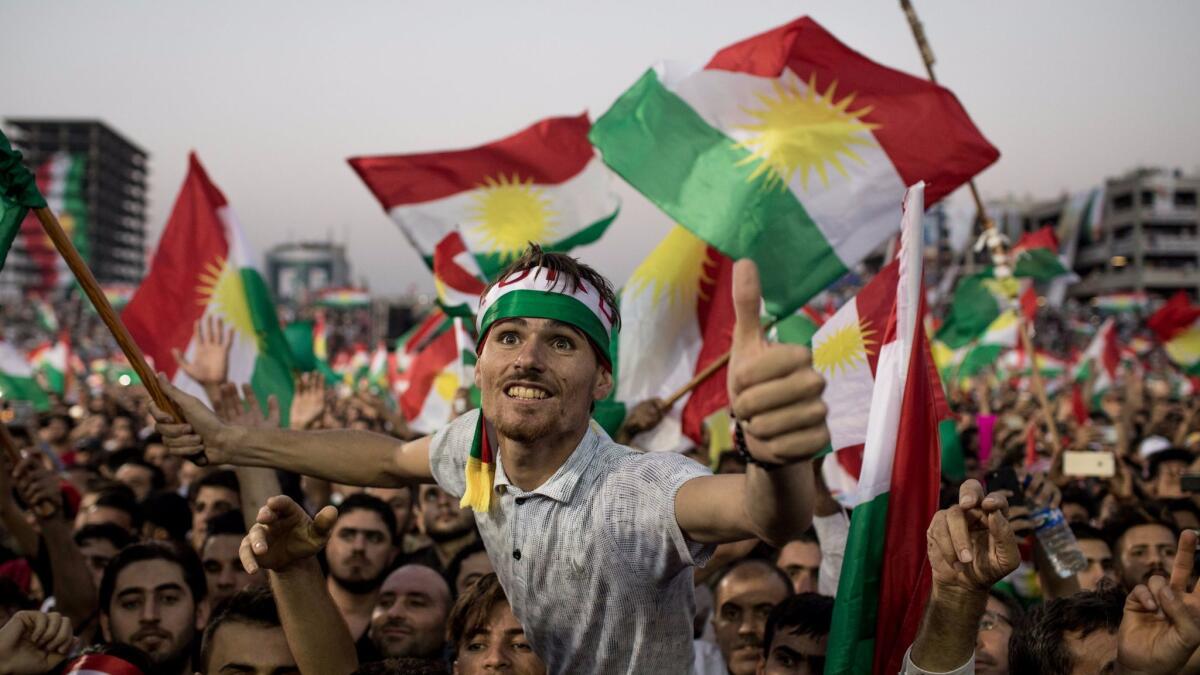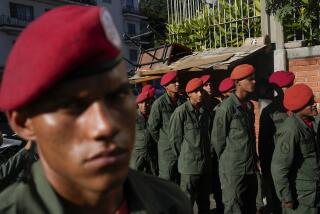Independence vote puts Iraqi Kurds at odds with neighbors and allies, including the U.S.

- Share via
Reporting from Irbil, Iraq — For the jubilant, flag-waving throngs who filled rallies across Iraq’s semiautonomous Kurdish enclave in recent weeks, a vote on independence Monday represents a chance to realize a dream cherished for generations.
But every major player in the region opposes the referendum, placing the Kurds on a collision course with neighbors and allies, including the United States, which warns that it could ignite conflict with the central government in Baghdad and unleash ethnic fighting in a part of the world still roiled by the battle against Islamic State.
Kurdish forces played a pivotal role in the campaign to reclaim Mosul, the largest city to fall to the extremist group also known as ISIS and Daesh. But U.S. officials say the conflict over Monday’s referendum is undermining efforts to drive the militants from their remaining footholds in Iraq.
U.S. diplomats and their Western allies are making last-ditch efforts to persuade the northern Kurdish region’s president, Massoud Barzani, to delay the plebiscite in favor of mediated negotiations with Baghdad. The United Nations has also appealed for dialogue, saying it will not be “engaged in any way or form” in Monday’s referendum.
Diplomats are particularly concerned about the decision to hold voting in disputed areas that are controlled by Kurdish forces but claimed by Baghdad — notably the oil-rich city of Kirkuk. The move has raised tensions that they say Islamic State and other extremists are seeking to exploit.
Iraq’s prime minister, Haider Abadi, called the referendum a “dangerous escalation” and said he was prepared to intervene militarily if violence breaks out. Iraq’s parliament declared the plebiscite unconstitutional and moved to dismiss the Kurdish governor of Kirkuk, who supports the referendum and says only the provincial council can remove him.
Two of Iraq’s neighbors, Turkey and Iran, concerned that the referendum could inflame secessionist aspirations among their own Kurdish minorities, have said they are considering countermeasures. Turkey is carrying out military drills near northern Iraq, and Iran has threatened to close its border with the landlocked Kurdish enclave.
“If this referendum is conducted, it is highly unlikely that there will be negotiations with Baghdad, and the above international offer of support for negotiations will be foreclosed,” State Department spokeswoman Heather Nauert said in a sharply worded statement Wednesday.
Analysts don’t rule out the possibility of a last-minute compromise. But without iron-clad guarantees and a road map to independence, they say Barzani is unlikely to back down.
“The Kurds have repeatedly deferred their nationalist aspirations in the hope that Iraq would fulfill its pledge” to address longstanding grievances, said David L. Phillips, a former State Department advisor now at Columbia University’s Institute for the Study of Human Rights. “That hasn’t happened.”
In an address to supporters Friday in the Kurdish regional capital of Irbil, Barzani insisted the vote would go ahead, saying Iraq’s Kurds are ready “to pay any price for freedom.”
Kurdish leaders contend their region has earned the right to self-determination: It has lost nearly 1,800 fighters in the U.S.-led campaign against Islamic State and sheltered an estimated 1.8 million people displaced by the conflicts in Iraq and Syria over the past three years.
There is also concern among a generation of Kurdish nationalist fighters that a window of opportunity to cement their legacy may be closing.
“If and when Daesh is defeated … the United States will have less interest in investing in its relationship with Kurdish parties in northern Iraq and Syria,” said Joost Hiltermann, program director for the Middle East and North Africa at the International Crisis Group, a Brussels-based think tank.
The region’s Kurds, who number an estimated 30 million, have longed for a state of their own since at least the end of World War I, when they were partitioned among Iraq, Iran, Syria and Turkey.
They thought they were on the way to securing one after the 1991 Gulf War, when the U.S. and Britain enforced a no-fly zone over northern Iraq to protect Kurds from the country’s late strongman Saddam Hussein, whose military killed tens of thousands of them, including with chemical weapons.
Kurdish leaders made another bid for statehood after Hussein was toppled in 2003, but they were persuaded to be patient. Now they say their patience has run out.
“We were promised by American and other international partners that this will be a democratic Iraq. But after 14 years waiting for that democratic Iraq, we realized that we’re not getting there,” said Falah Mustafa Bakir, the Kurdistan Regional Government’s foreign minister, who was in New York this week for the U.N. General Assembly. “We have been treated as part-time Iraqis.”
Promises by Arab leaders in Baghdad to resolve disputes over territorial boundaries, the distribution of oil revenues and the status of Kurdish fighters known as the peshmerga have not been fulfilled, he said. And public employees have not received their full salaries since Baghdad stopped sending budget payments to Irbil in 2014.
“The time has come for us to go our own way,” Bakir said. “But we want to do that peacefully, through dialogue and understanding.”
Kurdish leaders say Monday’s vote won’t result in an immediate declaration of independence but will provide a mandate to negotiate an amicable separation from Baghdad. They dismiss fears that this would divert attention from the campaign against Islamic State or pose a threat to Iraq’s neighbors.
“We are committed to continue the fight against ISIS,” Bakir said.
Despite the heated rhetoric coming from Baghdad, analysts say Prime Minister Abadi has shown a willingness to discuss the possibility of an independent Kurdish state — but not if it includes Kirkuk and its lucrative oil wells.
Kurdish forces took control of Kirkuk in 2014, after Iraqi government troops fled an assault by Islamic State militants.
The city, which is home to Kurds, Arabs and Turkmen, has long been a flashpoint between Irbil and Baghdad. Shiite Muslim militias, which are sanctioned by the Shiite-led government in Baghdad and also receive support from Iran, have deployed around Kirkuk and other disputed territories, vowing to resist any attempt to break up Iraq.
But for all the saber-rattling, there is excitement within the Kurdish enclave about Monday’s vote.
In Irbil, a stronghold of Barzani and his Kurdistan Democratic Party, streets are festooned with red, white and green Kurdish flags. Drivers cruise the city, honking their car horns and displaying posters of the Kurdish leader. Fireworks light up the sky at nightly rallies.
Khabat Abdallah, a 41-year-old peshmerga fighter, brought his wife and six children to see the festivities outside the city’s ancient citadel. A veteran of the wars against Hussein and Islamic State, he carried the pictures of slain comrades on his cellphone. He was looking forward to casting a vote for independence.
“We never felt that we are part of Iraq,” Abdallah said, as he hoisted up his 3-year-old son to get a better view of a group of traditional dancers. “Saddam used chemical weapons against us when we asked for our rights, and [former Prime Minister Nouri] Maliki cut our budget and salaries.”
There is little doubt about the referendum’s outcome — Iraqi Kurds overwhelmingly support independence. But some of Barzani’s rivals view the vote as a ploy to divert attention from the failings of a corrupt leadership beset by political discord and an economic crisis brought on by plummeting oil prices. Others worry that holding the vote now invites a risky conflict with allies and trading partners.
Kamal Salih, 47, who runs a sweets shop in the Kurdish city of Sulaymania, said he won’t be voting Monday.
“Our Kurdish leadership is not up to running a state,” he said.
Times staff writer Zavis reported from Los Angeles and special correspondent Resol reported from Irbil.
Twitter: @alexzavis
ALSO
Iran pushes back on Trump’s U.N. attack
A brave soldier and one horrible day: two lasting memories of Iraq
Rival Palestinian groups appear to move toward unity after a 10-year split
More to Read
Sign up for Essential California
The most important California stories and recommendations in your inbox every morning.
You may occasionally receive promotional content from the Los Angeles Times.











